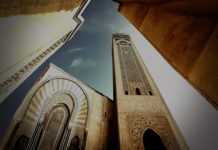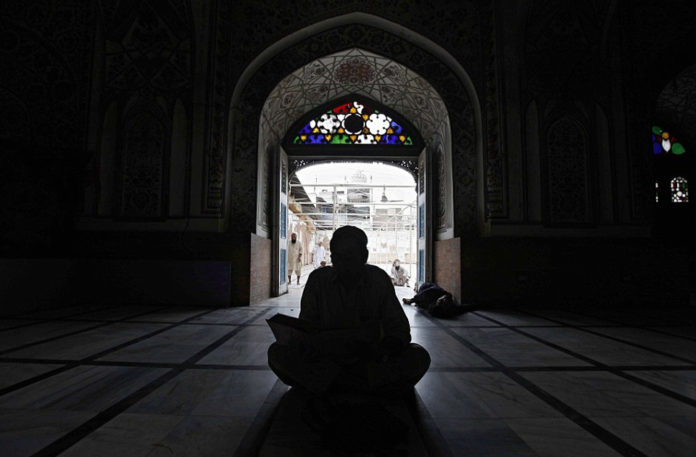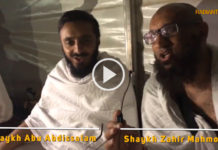Different Names
Qiyam means ‘standing’ and Qiyam al-Layl means ‘standing at night’. In the
Shariah term both terms refer to ‘the voluntary night prayer, whose time extends after the Isha prayer (the last of the five obligatory prayers, whose time extends from the disappearance of the reddish light in the sky until the middle of the night) until dawn.
This voluntary prayer is described as Qiyam al-Layl because it involves long standings, in which long portions of the Qur’an are recited. Other common names for this prayer are ‘Salat al-Layl’ (the night prayer), Tahajjud (from hajjada meaning awake at night), witr and Tarawih (resting). [Lisan ul-Arab under ‘Hajada’ and ‘Rawaha’]
Its should be noted that Tahajjud is not different from Qiyam and Tarawih, these are different names of the same prayer. Commonly the word Taraweeh is used to describe this prayer in Ramadaan, the Muslims used this term from early times. Muhammad Shaqrah says: The reason for this name is that due to long recitation the people used to rest after every four rak’ah. Eventually this practice became a necessary element of Taraweeh even with short recitations. This led people to think that Tarawih is the correct name revealed to Allah’s Messenger (sallallahu alaihi wa-sallam). [Irsad us- Sari p.75-77]
This name is wrong in text and in meaning. This name is neither known from Allahs Messenger (sallallahu alaihi wa-sallam) nor his companions, and as for the meaning the Prophet (sallallahu alaihi wa-sallam) never taught the practice of resting between particular rakahs. Thus, Tarawih is a novel name and it is better to use the name which the Messenger of Allah (sallallahu alaihi wa-sallam) used for this prayer;Qiyam.
One might ask, ‘Is it wrong to rest between rakahs? The answer is – ‘If the Imam is tired or feels that the people praying behind him are tired from long standing and recitation, he may allow some rest [Irshad us-Sari (p: 75-77)]
The Excellence of Qiyam al-Layl:
Many Qur’anic verses speak about the excellence of Qiyam and the merits of those people, who perform Qiyam al-Layl on a regular basis, for example, Allah describes the believers who deserve Jannah saying:
| They (the believers) forsake their beds, to invoke their Lord in fear and hope; and they spend out of what We have bestowed on them. [Surah as-Sajdah (32): 16] They (the pious) used to sleep but little at night. [Surah ath-Thariyat (51): 17] |
Also, numerous Ahadith add to this subject, narrated Abu Hurayrah (radhi allahu anhu): The Messenger of Allah (sallallahu alaihi
wa-sallam) said:
| The best prayer after those prescribed is (the prayer performed) in the depth of night. [Sahih Muslim and Musnad Ahmad] |
He (sallallahu alaihi wa-sallam) also said:
| The most beloved prayer to Allah was of Dawud (alaihi as-salam). He slept one half of the night, got up (and prayed) for one third, and then slept (the remaining) one sixth. [Sahih al-Bukhari and Sahih Muslim] |
Protection from Shaitan:
Abu Hurayrah (radhi allahu anhu) reported that the Messenger of Allah (sallallahu alaihi wa-sallam) said:
| When one of you goes to sleep, Shaitaan ties three knots over the rear of his head, blowing into each knot, ‘You have a long night, so sleep on. If he wakes up and mentions Allah, one knot loosens. If he makes wudhu (ablution for prayer), another knot loosens and if he prays, the third knot loosens and he becomes lively and good-natured; otherwise he gets up ill-natured and lazy. [Sahih al-Bukhari and Sahih Muslim] |
Acceptance of Supplication:
Abu Hurayrah (radhi allahu anhu) reported that the Messenger of Allah (sallallahu alaihi wa-sallam) said:
| Our Lord descends every night to the lowest heaven, when only one third of the night has remained. He says: Who will invoke Me, so that I may give him? Who will seek My forgiveness, so that I may forgive him. [Sahih al-Bukhari and Sahih Muslim]
In another report, he adds: Then Allah extends His Hand and says: Who wants to invest (good deeds) with the One who is not wasteful or unjust? He continues to say this until the dawn arrives. [Sahih Muslim] |
Jabir (radhi allahu anhu) reported, the Messenger of Allah (sallallahu alaihi wa-sallam) saying:
| There is an hour of the night which no Muslim person encounters and asks for a good thing for this life or the Hereafter, but Allah grants it to him. This happens every night. [Sahih Muslim] |
Abu Umamah (radhi allahu anhu) reported that the Prophet (sallallahu alaihi wa-sallam) was once asked: When are the supplications most acceptable? He (sallallahu alaihi wa-sallam) replied: In the last depth of the night and at the end of the prescribed prayers. (hasan) by Shaikh al-Albani
at-Tirmidhi)
Muadh bin Jabal (radhi allahu anhu) reported that Allah’s Messenger
(sallallahu alaihi wa-sallam) said:
| Whenever a Muslim goes to bed in a pure state (with wudhu), falls asleep while mentioning Allah and then wakes up during the night and asks Allah for anything good, He grants it to him.
(sahih) by Shaikh al-Albani (Musnad Ahmad and at-Tirmidhi) |
Closeness to Allah:
Amr bin Abash (radhi allahu anhu) reported that Allah’s Messenger (sallallahu alaihi wa-sallam) said:
| The closest that a servant is to his Lord, is in the last part of the night. If you can be among those who remember Allah at that hour then do so. (sahih) by Shaikh al-Albani (at-Tirmidhi) |
Mercy from Allah:
Abu Hurayrah (radhi allahu anhu) reported that the
Messenger of Allah (sallallahu alaihi wa-sallam) said
| May Allah have mercy on a man who wakes up at night, prays and wakes his wife to pray; and if she refuses, he sprinkles water on her face. And may Allah have mercy on a woman who wakes up at night, prays, and wakes her husband to pray and if he refuses, she sprinkles water on his face. (hasan) by Shaikh al-Albani (Abu Dawud) |
Constant deeds guarantee ample reward:
Aa’ishah (radhi allahu anha) said: Do not ever stop praying Qiyam. The Prophet (sallallahu alaihi wa-sallam) never ceased praying it. When he was sick or weak, he prayed sitting.” (sahih) by Shaikh al-Albani (Abu Dawud)
She also reported the Messenger of Allah (sallallahu alaihi wa-sallam) saying:
| The most beloved deeds to Allah are the most constant, even if they were little. [Sahih al-Bukhari and Sahih Muslim] |
The Excellence of Qiyam in Ramadan:
Many Ahadith describe the excellence of Qiyam particularly in Ramadan, some of them are:
Forgiveness of sins:
Abu Hurayrah (radhi allahu anhu) reported:
| Allah’s Messenger (sallallahu alaihi wa-sallam) encouraged the people, without making it an absolute command, to perform Qiyam during Ramadan. He (sallallahu alaihi wa-sallam) used to say: Whoever stands (in Qiyam) in Ramadaan out of faith and expectation (of Allah’s Reward), all his previous sins will be forgiven. [Sahih al-Bukhari and Sahih Muslim] |
Among the Most Righteous:
Amr bin Murrah al-Juhani (radhi allahu anhu) said: A man from the tribe of Quraysh asked the Messenger of Allah (sallallahu alaihi wa-sallam): O Messenger of Allah sallallahu alaihi wa-sallam)! What if I testified that there is no (true) god except Allah and that you are Allah’s Messenger, prayed the five prayers, fasted the month, stood for Qiyam in Ramadan and paid Zakah? The Prophet (sallallahu alaihi wa-sallam) replied: Anyone dying like this will be among the siddiqun (the highly virtuous) and the shuhadah (martyrs). (sahih) Ibn Khuzaymah and Ibn Hibban]
Getting up for Qiyam al-Layl:
Many Ahadith report the actions of Allah’s Messenger (sallallahu alaihi wa-sallam) when he got up at night. Some of them are:
Siwak and Wudhu:
| As soon as the Messenger of Allah (sallallahu alaihi wa-sallam) got up for Qiyam al-Layl, he would brush his teeth with a siwak and perform wudhu, he (sallallahu alaihi wa-sallam) said: When one of you gets up to pray at night, let him use a siwak (to clean his teeth), because when he recites during the prayer, the angel puts his mouth over his, so that nothing leaves his mouth but will enter into the angel’s mouth. (sahih) by Shaikh al-Albani (al-Bayhaqi and others) |
Mentioning Allah:
Ubadah bin as-Samit (radhi allahu anhu) reported that the Prophet (sallallahu alaihi wa-sallam) said:
| Whoever wakes up at night and says: ‘La ilaha illallahu wahdahu la sharika lahu, lahul mulku wa-lahul-hamdu wa-huwa ala kulli shay’in qadir. Wa-subhan allahi wal-hamdu lillahi wa-la ilaha ilallallahu wallahu akbaru, wa-la hawla wa-la quwwata illa billah’ [DownLoad as-Sunnah Bimonthly Islamic Newsletter (Ramadan Issue) to view the complete Arabic Text] |
| There is no (true) god except Allah Alone, without any partners. To Him belongs the sovereignty; to Him belongs all praise. He is capable of everything. Exalted is Allah; Allah is the Greatest, there is no power or might except from Allah. and then says: Rabb igfir li – My Lord! Forgive me. Anyone who says this and supplicates, he will be answered, and if he makes wudhu and prays, his prayer will be accepted. [Sahih al-Bukhari] |
Rabi’ah bin Ka’ab al-Aslami (radhi allahu anhu) reported: I used to sleep by the house of Allah’s Messenger (sallallahu alaihi wa-sallam). When he got up at night (to pray), I would hear him repeat for a long time: Subhana rabbil-alamin – Exalted is the Lord of the creation.
Then he would repeat for a long time: Subhan Allahi wa bi-hamdih – Exalted is Allah, all praise belongs to Him.
(Sahih) by Shaikh al-Albani (at-Tirmidhi)
Raising ones voice moderately:
One may pray Qiyam silently or aloud, but it is best to raise one’s voice moderately.
| Abu Qatadah (radhi allahu anhu) reported that one night the Messenger of Allah (sallallahu alaihi wa-sallam) saw Abu Bakr (radhi allahu anhu) praying with a low voice. He then saw Umar (radhi allahu anhu) praying with a loud voice. Afterwards, he said to Abu Bakr (radhi allahu anhu): O Abu Bakr! I passed by you while you prayed and you were lowering your voice.He replied: I have been heard by Him whom I was addressing, O Messenger of Allah (sallallahu alaihi wa-sallam)! |
Then the Prophet (sallallahu alaihi wa-sallam) said: O Umar! I passed by you while you prayed, and you were raising your voice. He replied: “O Messenger of Allah (sallallahu alaihi wa-sallam)! Thereby I wake the sleepy and drive the Shaytan away. So, the Messenger of Allah (sallallahu alaihi wa-sallam) said: O Abu Bakr, raise your voice a little. And you Umar, lower your voice a little. (sahih) by Shaikh al-Albani (Abu Dawud and at-Tirmidhi)
Ibn Abbas (radhi allahu anhu) reported: The Prophet’s (sallallahu alaihi wa-sallam) recitation (in Qiyam) was such that one would hear him from the outer room while he is inside (in the bedroom). (hasan) by Shaikh al-Albani (Abu Dawud)
Praying Qiyam al-Layl in the Jama’ah:
It is a Sunnah to pray the Qiyam al-Layl of Ramadan with the Jama’ah
(congregation); and this is better than praying it individually. The
Prophet (sallallahu alaihi wa-sallam) himself established the practice of praying Qiyam al-Layl in Jama’ah, approved of it from the Sahabah (radhi allahu anhu) and greatly emphasized its merits.
A’ishah (radhi allahu anha) reported: The people used to pray during the night of Ramadan in the Prophets Mosque in separate groups. A man who knew some Qur’aan would lead five or six people in Jama’ah. On one such night, the Messenger of Allah (sallallahu alaihi wa-sallam) instructed me to lay down a mat for him (in the Masjid) by the door of my apartment and I did so. After praying Isha, Allah’s Messenger (sallallahu alaihi wa-sallam) went to that mat, all those who were in the Masjid gathered behind him; and he (sallallahu alaihi wa-sallam) led them in the prayer for a long portion of the night; then he departed and entered (my apartment), leaving the mat where it was.
In the morning, the people described that Allah’s Messenger (sallallahu alaihi wa-sallam) led some men in prayer on the previous night. So that night, more people gathered until the Masjid was full. Allah’s Messenger (sallallahu alaihi wa-sallam) went out the second night and prayed; and they followed him in the prayer.
The next morning people talked about it and on the third night the number of people increased in the Masjid. Again the Messenger of Allah (sallallahu alaihi wa-sallam) went out and they followed him in prayer.
On the fourth night, the Masjid was overrun with people. Allah’s Messenger (sallallahu alaihi wa-sallam) prayed Isha with them and went inside his house, but the people stayed, so Allah’s Messenger (sallallahu alaihi wa-sallam) asked me: What do they want Aa’ishah? I said: “O Messenger of Allah (sallallahu alaihi wa-sallam)! The people have gathered to follow you (in the prayer). He (sallallahu alaihi wa-sallam) said:Fold away your mat., which I did. He (sallallahu alaihi wa-sallam) was aware of the people waiting for him that night; some men even called out, ‘The Prayer.’
In the morning, Allah’s Messenger (sallallahu alaihi wa-sallam) went out for the Fajr prayer and after he finished his Salaat he turned to the people, said the Shahadah and stated: O people, by Allah all praise is due to Him, I was not unaware of your presence last night, but I only feared that the night prayer (Qiyam) would become an obligation for you, which you would be incapable of fulfilling. So commit only to the deed you would be capable of performing, because Allah does not tire (from yours deeds) until you tire.
[Sahih al-Bukhari, Sahih Muslim, Abu Dawud, an-Nisa’i, Musnad Ahmad and others]
Besides praying Qiyam al-Layl in the Jama’ah himself, the Messenger of Allah (sallallahu alaihi wa-sallam) greatly encouraged this practice. Once, after leading the people in the Qiyaam prayer of Ramadan, when he was leaving and people requested him to continue the prayer for the other part of the night, he (sallallahu alaihi wa-sallam) said:
| Whoever stands in prayer with the Imam until he (the Imam) concludes the prayer, it is recorded for him that he prayed the whole night. (sahih) Abu Dawud, at-Tirmidhi, al-Bayhaqi |
His statement: Whoever stands in prayer with the Imam clearly indicates the excellence of Qiyam al-Layl behind the Imam. Thus, even though delaying Qiyam carries special merits, praying Qiyamal-Layl with the Jama’ah, early in the night is better than praying it alone, late in the night. This is why Umar (radhi allahu anhu), revived this Sunnah in his Khilafah and the Muslims continue it till now.
Wrong Conclusions from Umar’s (radhi allahu anhu) action:
Many people use this act (reviving the sunnah of Qiyaam al-Layl in Jama’ah) of Umar (radhi allahu anhu) as basis for misconceptions like: Praying Qiyam in Jama’ah is a bidah which was not known during the time of Prophet (sallallahu alaihi wa-sallam) – AND – Some Bidah’s (Innovations) are praiseworthy; and general statements by the Prophet such as: Every bidah is an act of misguidance should be restricted by the statement of Umar: This is indeed a good matter.
The error of the former misconception is apparent from the preceding
hadith of A’ishah (radhi allahu anha), which clearly indicates that the Messenger of Allah (sallallahu alaihi wa-sallam) himself prayed the Qiyam with the people in the Jama’ah for three consecutive nights in Ramadan; and he only stopped for fear that it would become an obligation for his Ummah!!
The latter argument of restricting the Hadith of Allahs Messenger
(sallallahu alaihi wa-sallam) to the statement of Umar (radhi allahu anhu) is also invalid.
In his statement, Umar (radhi allahu anhu) did not intend the Shariah
meaning of Bidah (i.e.to innovate something new in the religion of Islam without precedence) because he did not innovate the practice of Qiyam al-Layl in Jama’ah, rather it was an established practice of Allahs Messenger. He merely revived a great Sunnah of Allah’s Messenger (sallallahu alaihi wa-sallam). Umar only meant Bidah according to its linguistic meaning, which is something new which was not commonly known prior to its initiation.
Qiyam al-Layl behind one Imam was certainly not a common practice during the Khilafah of Abu Bakr (radhi allahu anhu) and a portion
of Umars (radhi allahu anhu). With this understanding it is a new matter, but since it is in accordance with the Prophet’s action, it is a Sunnah and not a Bidah. Describing it as good is only because of this reason and this is the understanding of the great scholars in explaining the statement of Umar (radhi allahu anhu).
For example, Ibn Hajr al-Haythami said: Driving the Jews and Christians out of the Arabian peninsula, and fighting the Turks, are not Bidahs, because these were done by the command of Allah’s Messenger (sallallahu alaihi wa-sallam), even though they were not done during his lifetime. And in the saying of Umar regarding Qiyaam al-Layl:This is indeed a good Bidah he meant the linguistic meaning of Bidah, which is to do something which was not done, it is similar to the saying of Allah:
| I did not bring something unprecedented (bidah) among the messengers. [Surah Ahqaf (46): 9] |
This (Umars action) does not indicate a Bidah in the Shari’ah sense,
because such a Bidah would be an act of misguidance, as was indicated by the Messenger of Allh (sallallahu alaihi wa-sallam)… Just look at the Sahabah (radhi allahu anhu) and those who followed them in the good way, they objected calling the adhan (call for prayers) other than the five daily prayers, such as Eid prayer, even though no specific prohibition is found in this regard
. Furthermore, there are things which the Prophet (sallallahu alaihi wa-sallam) avoided despite the need and ability to do them during his lifetime. Avoiding such things is a Sunnah and performing them is a blameworthy innovation. By our saying:
Despite the need and ability to do them, we exclude driving out the Jews and other things which he (sallallahu alaihi wa-sallam) did not do because of reasons that prevented him from doing them. Similarly, there was a need to pray Qiyam al-Layl in Jama’ah, but there was also a reason which prevented the Prophet (sallallahu alaihi wa-sallam) from continuing to pray it in Jama’ah.
[Al-Ibda fi Madarr il-Ibtida]
Abd ul-Wahhab as-Subki said: Ibn Abd ul-Barr said:
Umar did not legislate except what Allah’s Messenger (sallallahu alaihi wa-sallam) legislated and what he (sallallahu alaihi wa-sallam) loved and accepted. Nothing prevented him (sallallahu alaihi wa-sallam) from continuing (with Qiyam al-Layl in Jamaah) except fearing that it would become an obligation for his Ummah, because he was kind and merciful towards the believers. Umar (radhi allahu anhu) learned from Allah’s Messenger (sallallahu alaihi wa-sallam) and understood that one cannot add to the obligations or take away from them after his (sallallahu alaihi wa-sallam) death. He therefore established Qiyaam al-Layl for the people in Jamaah, revived it, and commanded it [Ishraq ul-Masabih fi salat fi Tarawih (1: 168)]
Women joining the Jama’ah:
Women are permitted to attend Qiyam al-Layl, as is indicated in the Hadith of Abu Dharr (radhi allahu anhu), he said: He (the
Messenger of Allah (sallallahu alaihi wa-sallam)) gathered his family, his wives and the people. He led us in the prayer (for a long time in qiyam of Ramadaan)
(sahih) Abu Dawud, at-Tirmidhi and others
The Time of Qiyam al-Layl:
The time of Qiyam al-Layl starts after the Isha prayer up to the Fajr prayer. Abu Basrah (radhi allahu anhu) reported that the Messenger of Allah (sallallahu alaihi wa-sallam) said:
| Indeed Allah added a prayer for you, it is Witr (as explained earlier, Witr is one of the names for Qiyam al-Layl), so pray it between Isha and Fajr. (Sahih) by Shaikh al-Albani in as-Sahihah (108)] |
However, if one prays alone he should try to pray it in the later part of the night, because that is better than the earlier part, as the Prophet (sallallahu alaihi wa-sallam) said
| Whoever fears that he will not wake up in the later part of the night, then let him perform Witr in the first part of it and whoever expects to wake up in the later part of the night, let him pray it then. Indeed, the prayer of the night is witnessed (by the angels), and that is better. (Sahih) Abd ur-Razzaq |
Recitation during Qiyam al-Layl:
The Messenger of Allah (sallallahu alaihi wa-sallam) did not fix the length of recitation for Qiyam. His recitations varied in length; it was sometimes short, more often long, and extremely long on some occasions. Abdullah bin Amr (radhi allahu anhu) reported that the Prophet (sallallahu alaihi wa-sallam) said:
| Whoever prays Qiyam reciting ten verses, he will not be recorded among the negligent. Whoever prays Qiyam reciting one hundred verses, he will be recorded among the devout and whoever prays Qiyam reciting one thousand verses, he will be recorded among those with a multitude of good deeds. (Hasan) by Shaikh al-Albani (Abu Dawud) |
The longer the Qiyam, the better. Thus, when one prays alone, he is
encouraged to make his recitation as long as possible.
Supplication:
Various supplications are reported from the Messenger of Allah r for the Qiyam prayer. In particular, there are some supplications, which he would say at the beginning of the Qiyam, before reciting the Quran.
It is recommended to learn one of these, which would allow practicing the Sunnah in a better way. Following are three narrations:
1 – O Allah! All praise belongs to You; You are the Custodian of the Heavens and Earth and all that is therein. And all praise belongs to You; You are the lighter of the Heavens and the Earth and all that is therein. And all praise belongs to You; You are the Sovereign of the Heavens and the Earth and all that is therein. And all praise belongs to You; You are the Truth; Your Promise is the truth; meeting Your (in the Hereafter) is true; Your Speech is true; Jannah is true; the Fire is true; the Prophets are true; Muhammad (sallallahu alaihi wa-sallam) is true; and the Hour (of Doom) is true. O Allah! I submit myself to You, believe in You, rely on You, turn to You, fight for You, and invoke You. So forgive what I have done in the past or will do in the future, what I hide or declare, and what you know better than me (of what I did). You are the One, Who brings (some people) forward, and moves back (the others). There is no (true) god except You, and there is no (god) than you.
[Sahih al-Bukhari and Sahih Muslim], [DownLoad as-Sunnah Bimonthly Islamic Newsletter (Ramadan Issue) to view the complete Arabic Text]
2 – O Allah, Lord of Jibreel, Mika’il, Israfil, Creator of the Heavens and the Earth, Knower of the hidden and the witnessed things, You will judge among your slaves about that wherein they used to differ. Guide me to the truth in matters of difference, with Your Permission, You guide whomever You will, to the straight path.
[Sahih Muslim] [DownLoad as-Sunnah Bimonthly Islamic Newsletter (Ramadan Issue) to view the complete Arabic Text]
3 – Exalted are You, my Lord, all praise belongs to You, hollowed is Your Name; great is Your Honor; and there is no (true) deity but You. There is no (true) god except Allah. (three times) Allah is the Greatest, He is great indeed (three times). I seek refuge with Allah, the All-Hearing, All-Knowing, from the outcast Shaytan, from his spurring, blowing, and breathing.
(Sahih) by Shaikh al-Albani (Abu Dawud and at-Tirmidhi)
(NOTE: If you want to build a strong and powerful relationship with Allah, check out Islamia TV, where you can watch Islamic speakers from across the globe deliver inspiring and motivational courses. Learn more at www.islamia.tv.)

















































